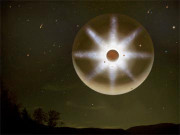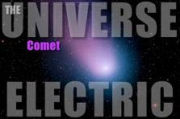|
|
$Billions Sucked into Black Holes - Science in the Present Time
by Dr. Jeremy Dunning-Davies
|
|
March 13, 2008
|
|
|
Introduction
As more and more money is being requested for scientific
experiments which are becoming more and more elaborate, it becomes
increasingly important to attempt to explain the basic theory behind
the work involved to those who, in the end, pay the bill - YOU -
the members of the general public.
Many look on in awe and wonder when told of the Large Hadron Collider.
They have little idea what it is or, in reality, what those in charge
hope it will do but are carried along on a wave of, quite probably,
genuine enthusiasm from those involved. The lack of knowledge, though,
is emphasised by the genuine fear felt by some at the belief that, when
switched on, this powerful machine would produce a black hole that would
swallow up the Earth.
Ridiculous as this may sound, there were people who did believe this
and were genuinely stressed by the day of the switch-on. The cost of
this machine, as well as the enormous cost of running and maintaining
it, are almost beyond the comprehension of many members of the general
public.
Then there is LISA, the Light Interferometer Space Antenna; another
project costing vast quantities of money and, yet again, a project
funded eventually by an uncomprehending public.
The question must be raised as to whether this is an ethically
correct position or not. Also, it seems only right and proper
for all those paying the bill to be given some idea of the total
background position for each and every one of these massive projects.
The need for complete openness is emphasised when the plight of so
many, unfortunate to suffer from a grave lack of food or be in the
grip of some presently incurable disease or condition, is considered
also.
There is little doubt that it would be extremely difficult, if not
pointless, to explain the detailed thinking behind some of these
modern projects in the general area of cosmology for example, to
the general public. This is not to appear élitist; it is
rather that much of the theoretical background is so complex that
relatively few professional scientists understand all the ramifications.
Hence, how do you explain the background to people unused to the world
of the scientist?
It is not an easy task but is one that must be attempted and attempted
with complete honesty. By honesty is meant the need to explain ALL the
background. This would involve making everyone aware if
alternative theories and explanations for effects and observations
exist. At present, unfortunately, this is definitely not the
case.
Discussion of the Basic Problem
Much of the fear felt by so many as the day of the switch-on for the
Large Hadron Collider approached was occasioned by a lack of knowledge
of the real situation which arose for at least two reasons. Firstly,
the explanations offered were necessarily sketchy because the concepts
involved were so complicated and required vast amounts of background
knowledge in physics to gain a true understanding. Secondly, however,
no-one was made aware of the fact that other serious theories
abound which made some of the worries pointless.
For over a hundred years now, scientific thought seems to have been
held in the vicelike grip of two theories - relativity and quantum
mechanics. However, what of the qualms concerning these two theories?
Relativity
It is well documented that many eminent scientists harboured doubts
about the validity of relativity - both the special and general
theories - from the beginning. Some, such as Herbert Dingle who
became deeply troubled by aspects of the so-called twin paradox,
formed doubts after initially being passionate advocates of the
theory. Unfortunately, once those doubts arose, it seemed that
eliminating them became increasingly difficult, if the account
of events outlined in his book Science at the
Crossroads[1] is accurate.
Since those early days, little seems to have changed and, seemingly,
it is still the case that challenging the validity of the theories
of relativity is not a sensible career option. In fact, even showing
that the famous tests of general relativity may be explained by other
means[2] is regarded by some
as a veiled attack on the validity of Einstein's theory.
Quantum Mechanics
There have been worries expressed also over some points in quantum
mechanics almost from the very beginning of the subject. Frequently,
these have revolved around the role of the observer and over whether
or not quantum mechanics is an objective theory. One man who has
considered these points at length is Karl Popper, probably one of
the best known philosophers of science. Although he has written on
the topics at length, his book Quantum Theory and the Schism in
Physics[3] proves an
excellent source of his views.
He expresses the view that the observer, or, as he prefers to call
him, the experimentalist, plays exactly the same role in quantum
mechanics as he does in classical physics; that is, he is there to
test the theory. This, of course, is totally contrary to the so-called
Copenhagen Interpretation, which provides the normally accepted position.
This alternative view basically claims that “objective reality
has evaporated” and “quantum mechanics does not represent
particles, but rather our knowledge, our observations, or our
consciousness, of particles”. As Popper points out, there have
been a great many very eminent physicists who, over the years, have
switched allegiance from the pro-Copenhagen camp. He cites among these
Louis de Broglie and his former pupil Jean-Pierre Vigier, Alfred
Landé and, in some ways most importantly, David Bohm.
Bohm, himself an acknowledged and deeply respected thinker, wrote a
book on quantum theory, which was published in 1951, in which he
presented the Copenhagen point of view in minute detail. Later,
apparently under Einstein's influence, he arrived at a theory
“whose logical consistency proved the falsity of the
constantly repeated dogma that the quantum theory is 'complete'
in the sense that it must prove incompatible with any more detailed
theory”.
It was this very question of whether or not quantum mechanics is
'complete' which formed the basis of the intellectual struggle
between Einstein and Bohr. Einstein said 'No'; Bohr claimed 'Yes'.
The whole problem is discussed in great detail by Popper and, for
those interested in this important topic, there can be no better
reference than the book by Popper mentioned already.
It should be noted also that people like Dingle and Bohm
who have dared to question what might be termed conventional scientific
wisdom have had their position within the scientific community brought
into question.
Black Holes
The two enormously expensive undertakings mentioned earlier - the
Large Hadron Collider and LISA - have much in common and illustrate
well the need for increasing public understanding of some highly
abstruse areas of modern science. Worries about the creation of
black holes which could swallow the Earth troubled many. LISA
will look for gravitational waves emanating from giant black
holes. Hence, black holes are mentioned in both projects but
what is the public's conception of a black hole and, indeed,
of gravitational waves, and how was that conception achieved?
For many years now, black holes have been popular in science
fiction and it is probable that, in many cases, the public's
perception of what such an object is was derived from some
work of science fiction rather than of pure science. This has
been augmented by numerous television programmes, purportedly
reporting genuine science. In truth, the programmes have reported
science but usually only advancing one explanation and ignoring
other possibilities.
The modern popular conception of a black hole is almost the
perfect example of the public being misled as to scientific
reality. Although the idea of a stellar body with an escape
speed equal to, or greater than, the speed of light goes back
to John Michell in 1784[4],
the modern notion initially comes from Schwarzschild's
solution[5] to the Einstein
field equations of general relativity. There are at least two major
problems associated with this and both are kept hidden from the public.
Firstly, a simple check of Schwarzschild's original article shows
immediately that the 'solution' so often quoted and
used[6] is not
actually Schwarzschild's solution. It is a later version due to
someone else. The original does not include the mathematical
singularity which leads to the idea of a black hole.
Gravity
Secondly, most modern work in this area of physics revolves around
advancing explanations which depend on gravity only; the possible
effects of any other forces are effectively ignored. However, most
of the matter in the Universe is in the form of plasma. As such,
electric currents will be circulating and magnetic fields will be
playing a role.
The electromagnetic force is much stronger than gravity by something
of the order of thirty-nine orders of magnitude and there is a school
of thought which feels that it is this force which plays the dominant
role in the Universe, - not gravity! People advocating this
alternative point out that black holes are simply not necessary in
their scenario for describing the workings of the Universe.
Incidentally, they also note that such esoteric notions as 'dark
matter' and 'dark energy' are unnecessary also. However, challenging
the popular view is not allowed as it actually raises questions about
the absolute validity of relativity and quantum mechanics.
This means that the public, which ultimately foots the bill for all
scientists do, is not being presented with all the facts before
embarking on financing various extremely expensive projects. This
is a position which must surely be altered.
Conclusion
Science should be studied with a totally open mind and any advances
should be examined in a like manner. Surely the aim of any scientific
investigation is to seek the truth? Probably mankind will always be
found wanting intellectually and any solution to a problem will be no
more than an approximation to the real truth, but efforts must continue
in all areas to find that elusive complete answer.
In the meantime, the dissemination of scientific information to the
public must be totally honest and open. Where several theories exist,
that fact must be openly acknowledged with no thought for protecting
vested interests of any sort. The task will be extremely difficult
because of the nature of the technical language and theory involved
but it must be attempted. If not, the day may come when, disillusioned
with science and scientists, the public refuses to continue funding
projects.
References
[1] H. Dingle, 1972, Science at the Crossroads,
(Martin Brian & O'Keefe, London)
[2] B. H. Lavenda, 2005, J. App. Sc. 5, 299 - 308
[3] K. R. Popper, 1982, Quantum theory and the Schism in Physics,
(Hutchinson, London)
[4] J. Michell, 1784, Phil. Trans. R. Soc. 74, 35
[5] K. Schwarzschild, 1916, Sitzungsberichte
der Königlich Preussischen Akademie der Wissenschaften zu Berlin, Phys-Math. Klasse, 189
[6] see for example:
R. Adler, M. Bazin, M. Schiffer, 1965, Introduction to General Relativity,
(McGraw-Hill, New York)
Addendum
Since compiling the above comments, I have been privileged to be invited
to address the Scarborough Astronomy Society again. I took as my title
'The Electric Universe' and gave a talk introducing the members to the
basic ideas involved. If I may say so, the talk went down extremely well -
not least because those present were being introduced to ideas totally
unknown to them. Considering the important role amateur astronomers have
played in the advancement of knowledge over the years, this is, I feel,
significant and supports the need for far more open discussion of all
sensible ideas in science.
Jeremy Dunning-Davies
|
|
|
Permalink to this article.
Public comment may be made on this article on the
Thunderbolts Forum/Thunderblogs (free membership required).
|
|
|
|
|
|
|




